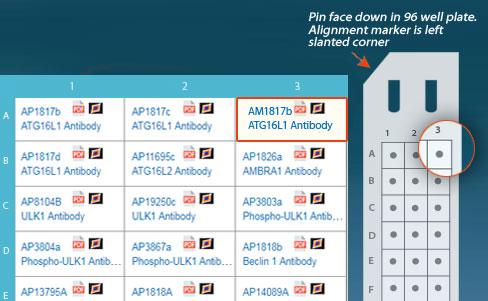
Want to Screen 24 Antibodies for the Price of One? Try Our New Product
Single-Use Antibody Screening Panel
Benefits of using Antibody Screening Panel
Rapid deposit of preloaded autophagy antibodies into assay wells with a simple snap and shake procedure
Screen samples against a diverse array of antibodies for the price of one full-sized antibody, without time-consuming pipetting
The Autophagy Pathway Rapid Screen Kit set simultaneously detects against all key players in this pathway using popular highly-cited antibodies
Additional sets are designed to achieve a granular screen against dozens of distinct antibodies against single targets such as the hallmark LC3 rotein, to find the antibody optimal for your system
Full sizes of each antibody are available, as well as inhibitors and cell lysates to support expanded study
How It Works
Abcepta offers single-use antibody panel for cost- and time-efficient screening assays. The product eliminate the repeated pipetting with the drop-&-mix design. Simply watch this video or read “User Manual ” with step-by-step explanation of how to use antibody panel for your research project.
How to Map an Antibody When It Is Deposited Into a 96 Well Plate


Abcepta’s Antibody Screening Panels
Autophagy Pathway Screener
Autophagy Protein Screener I
(LC3 Antibody)
Autophagy Protein Screener II
(ATG3, ATG7, ATG9, ATG10, ATG12)
Autophagy Protein Screener III
(ATG13, ATG16L, ULK1, Beclin, AMBRA1, SOGA1, DRAM)














 Foundational characteristics of cancer include proliferation, angiogenesis, migration, evasion of apoptosis, and cellular immortality. Find key markers for these cellular processes and antibodies to detect them.
Foundational characteristics of cancer include proliferation, angiogenesis, migration, evasion of apoptosis, and cellular immortality. Find key markers for these cellular processes and antibodies to detect them. The SUMOplot™ Analysis Program predicts and scores sumoylation sites in your protein. SUMOylation is a post-translational modification involved in various cellular processes, such as nuclear-cytosolic transport, transcriptional regulation, apoptosis, protein stability, response to stress, and progression through the cell cycle.
The SUMOplot™ Analysis Program predicts and scores sumoylation sites in your protein. SUMOylation is a post-translational modification involved in various cellular processes, such as nuclear-cytosolic transport, transcriptional regulation, apoptosis, protein stability, response to stress, and progression through the cell cycle. The Autophagy Receptor Motif Plotter predicts and scores autophagy receptor binding sites in your protein. Identifying proteins connected to this pathway is critical to understanding the role of autophagy in physiological as well as pathological processes such as development, differentiation, neurodegenerative diseases, stress, infection, and cancer.
The Autophagy Receptor Motif Plotter predicts and scores autophagy receptor binding sites in your protein. Identifying proteins connected to this pathway is critical to understanding the role of autophagy in physiological as well as pathological processes such as development, differentiation, neurodegenerative diseases, stress, infection, and cancer.